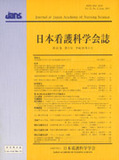Japanese
English
- 販売していません
- Abstract 文献概要
- 参考文献 Reference
- サイト内被引用 Cited by
要旨
目的:要支援高齢者の主観的健康感の関連要因を,要支援高齢者全体,および前期・後期・超高齢者の各群について明らかにする.
方法:居宅要支援高齢者1,732名に対し,郵送法でアンケート調査を実施した.単変量解析にて主観的健康感の関連要因を確認した後,多重ロジスティック回帰分析(変数増加法:尤度比)を行った.
結果:アンケート票は1,085通(63.1%)を回収し,1,046通(有効回答率96.4%)を分析対象とした.分析の結果,要支援高齢者の主観的健康感が低い要因として,「年齢層が若い」「経済状況が心配である」「認知症高齢者の日常生活自立度が自立」「現病歴数が多い」「自覚している身体機能の低下と症状数が多い」「睡眠による休息が取れていない」「うつ予防の支援が必要」「外出が週1回以下」が検出された.また,年齢層別の分析では,群により異なったリスク要因が示された.
結論:主観的健康感の向上には,要支援高齢者の経済状況の負担を軽減すること,生活習慣病やうつ等の発症進展を予防し症状を適切に管理すること,睡眠の満足感を高めること,外出頻度を増やすことが必要である.また,年齢層別の特徴に応じた支援方策が必要である.
Abstract
Purpose:This research aimed to clarify the factors related to the self-rated health of elderly persons requiring support(persons who were certified as“requiring support 1-2”by the long-term care insurance law in Japan), and verifies these factors according to age group.
Methods:Subjects comprised 1,732 elderly persons requiring support individuals who were sent self-administered questionnaires by postal mail.
Result:Data from 1,046 valid responses were subjected to logistic regression analysis. The following factors were found to be related to the self-rated health of elderly persons requiring support:“young age group,”“worry about the household finances,”“high degree of cognition,”“have many diseases,”“have many objective symptoms,”“dissatisfied with sleep,”“require preventive support for depression,”and“going out less than once per week.”
In the young-old, risk factors were“have many diseases,”“require preventive support for depression,”and“reduced activities of daily living.”In the old-old, risk factors were“worry about the household finances,”“high degree of cognition,”“have many diseases,”and“require preventive support for depression.”In the oldest-old, risk factors were“have many diseases,”“dissatisfied with sleep,”and“require preventive support for depression.”
Conclusion:The present findings suggest that it is important to improve the self-rerated health of elderly persons requiring support, reduce the pressure of household finances, prevent lifestyle-related diseases and depression, appropriately manage symptoms, improve satisfaction with sleep, and facilitate going out more frequently. In addition, it is necessary to develop support strategies that are suited to the characteristics of each age group.
Copyright © 2011, Japan Academy of Nursing Science. All rights reserved.


